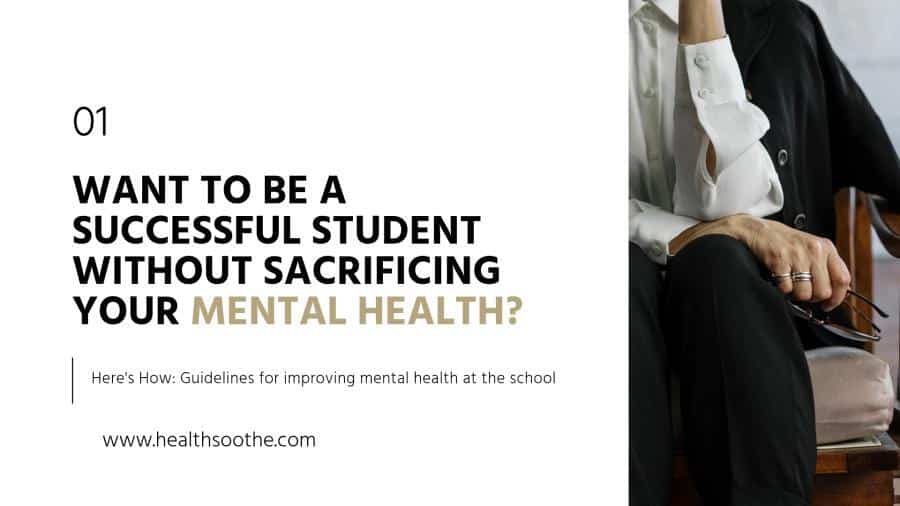Student life is always portrayed as a time of uninhibited freedom and finding yourself. While this might be true occasionally, being a student is a complex and varied experience depending on who you ask. The location of your school, the subjects you have chosen, the people in your class, and the pressure to succeed all contribute to a person's attitude towards their studies. Perhaps you are looking at college programs you might want to apply for, or maybe you are already taking part in your studies. Whichever the case may be, here are some useful tips to help you maintain good mental health as a student without compromising the success of your studies.
What Makes Being a Student So Difficult?
Being able to enjoy higher education is a privilege, but it can sometimes feel like a burden or an obstacle to overcome. There are many reasons for this, and no two students will necessarily experience the same problems with their studies. There are, however, several common overarching issues that many students seem to face that can negatively affect both their grades and their mental wellbeing. Here are a few examples that might ring true for you or someone you know:
- Moving away from familiar surroundings can be one of the most difficult aspects of becoming a student. Many undergraduate students apply for programs that aren't provided by their local school and so must travel to a whole new location for their studies. This means leaving behind friends and family as well as familiar and comforting surroundings. Being in a new place is sometimes exhilarating and inspiring, but it can also induce feelings of homesickness and loneliness.
- Saying goodbye to friends can make the transition from home life to student life much more difficult. Although some friends may also be moving to the same college or part of the world, this doesn't make it easier to part ways with other important people.
- The pressure to meet new people 1https://www.talkspace.com/mental-health/conditions/articles/college-making-new-friends-anxiety/ comes not only from the sudden separation of old friends but also the expectation that college should be a hugely social and active time in your life. This can lead to a person losing their sense of self in order to ingratiate themselves within a community or else risk feeling isolated or rejected by peers.
- Students often feel pressure to succeed 2https://www.healthyplace.com/blogs/copingwithdepression/2020/10/when-the-pressure-to-succeed-damages-your-mental-health in their studies, either from within themselves or from external sources such as family members. This is different from motivation and drive, since it can be limiting to their ability to concentrate on work. Students who put a lot of pressure on themselves to achieve highly are often prone to burnout and emotional pain due to stress.
- Similar to the last point, students can also feel pressure to keep up with those in their class. This might be academically - trying to match or surpass the grades of other students - or socially - wanting to maintain a group of friends or a level of social status. This might entail acting in ways that don't align with the student's own personality or values, leading to a sense of disconnection.
There are plenty of other ways that student life can negatively impact a student's mental wellbeing. A person's individual circumstances, home life, financial situation, health, and pre-existing mental health issues can all make studying much more difficult.
What Are the Common Mental Health Risks of Being a Student?
Since there are so many ways that student life can be so difficult, either for undergraduates starting college for the first time or mature students returning to studies, it is understandable that all these issues can take a toll on a student's mental health. Even students who appear to be doing well both academically and socially can be suffering from hidden troubles that prevent them from fulfilling their true potential. Take a look at some of the most common mental health problems that students face and ways that you can overcome them.
Anxiety Caused by External Pressure and Unrealistic Expectations
Problem: External pressure can cause a student to feel intense anxiety and lack of control in their life. When a parent or authority figure demands high achievement, the student can feel that nothing they do is good enough 3https://www.sciencedaily.com/releases/2022/03/220331101501.htm and that trying doesn't lead anywhere. High expectations are usually intended to spur someone on to fulfill their potential; however, it often has the opposite effect. When someone is frequently given the impression that they are constantly coming up short of expectations, they will feel inadequate and unsatisfied with their achievements no matter how hard they have worked.
Solution: To combat the unhealthy pressure felt by students with external demands placed on their shoulders, a more mindful and deliberate approach to work is best. This means understanding where the feelings of inadequacy are coming from and taking the time to undo the damage they have caused. It can also mean gently confronting the source of the external pressure and explaining that unrealistically high expectations are counterproductive to your efforts and ultimately lead to poorer results.
Stressful Timetable and Unmanageable Workload
Problem: Sometimes, the pressure doesn't come from outside but from the program of study. Intense and notoriously challenging subjects can be threatening to even the most competent of students. Having to complete tasks, study, attend classes, collaborate with peers, and maintain general wellbeing can all become too much for a student. Some colleges fail to notice the unreasonable burden they place on their students and demand so much that very few people can achieve success. This might come in the form of coursework that only serves to add to your workload 4https://medium.com/library-peer-network/student-weekly-tips-managing-your-academic-workload-64454151c20e rather than provide any meaningful learning material.
Solution: One way to overcome the potential issue of a workload you cannot manage is to apply instead for online learning. Thanks to the reliability of digital software making the world a more connected place, students can find their ideal program at a great school without sacrificing their work-life balance. This is because online learning is often far more flexible and built around students' needs. For example, if you want to apply for the SBU Online sports journalism masters program at St. Bonaventure University, then you can expect a program tailored to providing student-focused education that understands the need for flexibility.
Negative Inner Dialogue and Low Self-Esteem
Problem: Even if students are not pressured by external forces such as parents or authority figures, they can still feel this pressure internally with a negative inner dialogue that prevents them from maintaining healthy self-esteem levels 5https://www.webmd.com/mental-health/signs-low-self-esteem . Some students possess something of a mental drill sergeant that gives unreasonable orders and insults their abilities if they ever encounter a setback. This aversion to failure is often tied to perfectionism and obsessiveness. Students who suffer this way are sometimes convinced that they perform better with this high level of internal pressure, not believing that it could be doing more harm than good.
Solution: Self-esteem is an incredibly complex and difficult mental health issue to tackle alone. Although it can be done, it is usually best to seek the advice of a professional mental healthcare practitioner with impartial insight. They can help you to navigate your underlying thoughts that get in the way of you both feeling good about yourself and performing to the best of your ability. In fact, speaking to a mental health professional about your wellbeing is highly recommended for any student.
Social Anxiety Among Peers
Problem: Social anxiety 6https://www.mayoclinic.org/diseases-conditions/social-anxiety-disorder/symptoms-causes/syc-20353561 is a growing problem among much of the population. Although researchers are still discovering possible reasons for this and looking for ways to combat it, students suffering from social anxiety can feel incredibly distressed by their situation. The expectation that students are supposed to meet new people and form life-long bonds can be overwhelming, particularly for people who would describe themselves as more introverted than extroverted. Even though many schools offer different social clubs for students to meet like-minded people, it can be difficult to muster the courage to join a club if a student is already prone to social anxiety.
Solution: If you are someone who has experienced social anxiety and is concerned that this might impact your ability to study, it is important to remember that you can set your own boundaries 7https://psychcentral.com/lib/10-way-to-build-and-preserve-better-boundaries and take your time in social settings. Forget the idea that you must act a certain way or say the right words to people. As cliched as it might sound, being yourself is often the best bet, even if this means being relatively quiet until you have time to emerge from your shell. Pay attention to your own emotions, and don't feel embarrassed if you need to take time to yourself when approaching social situations.
Student Mental Health and Success
Despite the many ways that student life can bring you down, it doesn't have to get in the way of your success. With determination, patience, and focus, you can overcome your mental hurdles and achieve your goals.
Additional resources and citations
- 1https://www.talkspace.com/mental-health/conditions/articles/college-making-new-friends-anxiety/
- 2https://www.healthyplace.com/blogs/copingwithdepression/2020/10/when-the-pressure-to-succeed-damages-your-mental-health
- 3https://www.sciencedaily.com/releases/2022/03/220331101501.htm
- 4https://medium.com/library-peer-network/student-weekly-tips-managing-your-academic-workload-64454151c20e
- 5https://www.webmd.com/mental-health/signs-low-self-esteem
- 6https://www.mayoclinic.org/diseases-conditions/social-anxiety-disorder/symptoms-causes/syc-20353561
- 7https://psychcentral.com/lib/10-way-to-build-and-preserve-better-boundaries


